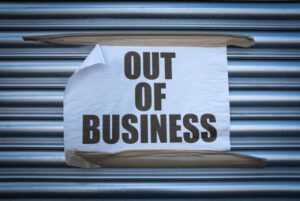In this digital age, some traditional business mantras tend to sound a bit old fashioned. The wisdom above, widely credited to Australian business guru Alan Miltz, has been doing the rounds for some years now. But trust us – it’s not old hat. Cash is essential for every business to survive and thrive. A lack of cash is the biggest killer of businesses, so if you want to avoid business failure, read on…
Miltz’ essential insight is that there’s no point in having a business with a big turnover if it doesn’t make a profit. And there’s no point making a profit unless some of it spins off into cash to oil the wheels of the business today and into the future. Even the biggest revenue businesses fail for lack of liquidity.
The silent assassin
Look at the facts and you’ll see this is not conjecture. Statistics show that 20% of UK businesses fail within 12 months. More frightening still 60% fail within three years. In most SME cases this is due to business owners committing their cash to product development and stock and forgetting to allow cash for commercial elements of the enterprise – those things that handle the ‘business of doing business’. Lack of cash is the silent assassin of businesses new and old – cash is the oxygen and life blood of commerce.
Time-phasing cash flow for success
There’s a lot of work involved in the ‘business of doing business’ and the only place ‘success’ comes before ‘work’ is in a dictionary. The challenge is that whilst that work needs paying for on Day 1, revenue takes time. Depending on the sector you operate in, the payment terms you have with your customers, and your sales channels, this can easily stretch to 90 days or beyond an actual ‘sale’.
Be honest about your “time to revenue”
Every business needs cash to cover its ‘time to revenue’. At one extreme, in traditional sectors, products need to be produced, packaged and stored before they can be sold, delivered and invoiced. Smart businesses will streamline this process by working on a ‘just in time’ production model to maximise stock throughput and minimise cash tied up in inventory. Service industries that bill on a monthly basis are less hostage to fortune to this, but even if customers pay on 30-day terms they are still exposed to up to two months’ costs.
Back in the good old days when banks were happy to advance overdrafts against a debenture on a company’s debtor book (long since gone out of practice), the rule of thumb was at least 3 months cover on costs. However, all you need is one client to default on payment and your cashflow forecasts can be blown to smithereens. So be honest about your time to revenue, build in some contingency and fail-safes, allow for a bad debt provision and make sure you have the right cash cover.
Digital businesses are not immune
Even in the online sector, where there may be no great bricks and mortar establishment costs, and people tend to pay on ordering (in principle moving the risk from the business to the customer) there will be a cash call for staffing and marketing before the sale is made. Then there will be a ‘post sale’ customer service requirement.
Planning for “Lack of failure”
Every business hopes to plan for success. But a more robust strategy for start-ups and scale-ups alike can be to start by planning not to fail. You will need funding to cover:
- Production costs and/or cost of stock acquisition
- Establishment costs – office, tech costs, mobile phones
- Internal staff and contractor costs (and recruitment costs)
- Outsourced agency costs – web agencies, accountancy, tech consultants
- Marketing/sales costs
- Compliance costs – NI, VAT, corporation tax
- Warehousing costs
On the budget spread sheet of course, all these factors are balanced against revenue. But in business revenue rarely comes first and sales and marketing forecasts are never as consistent and predictable as your rent and payroll are going to be.
Finally, if you see a squeeze coming and need to raise funds to keep your business liquid, it’s best to do so well in advance rather than as a last resort. If you need any help with that, we’d be happy to have a cup of tea and talk it through with you. Call us on 020 8662 6070 or contact us here and we will call you.



